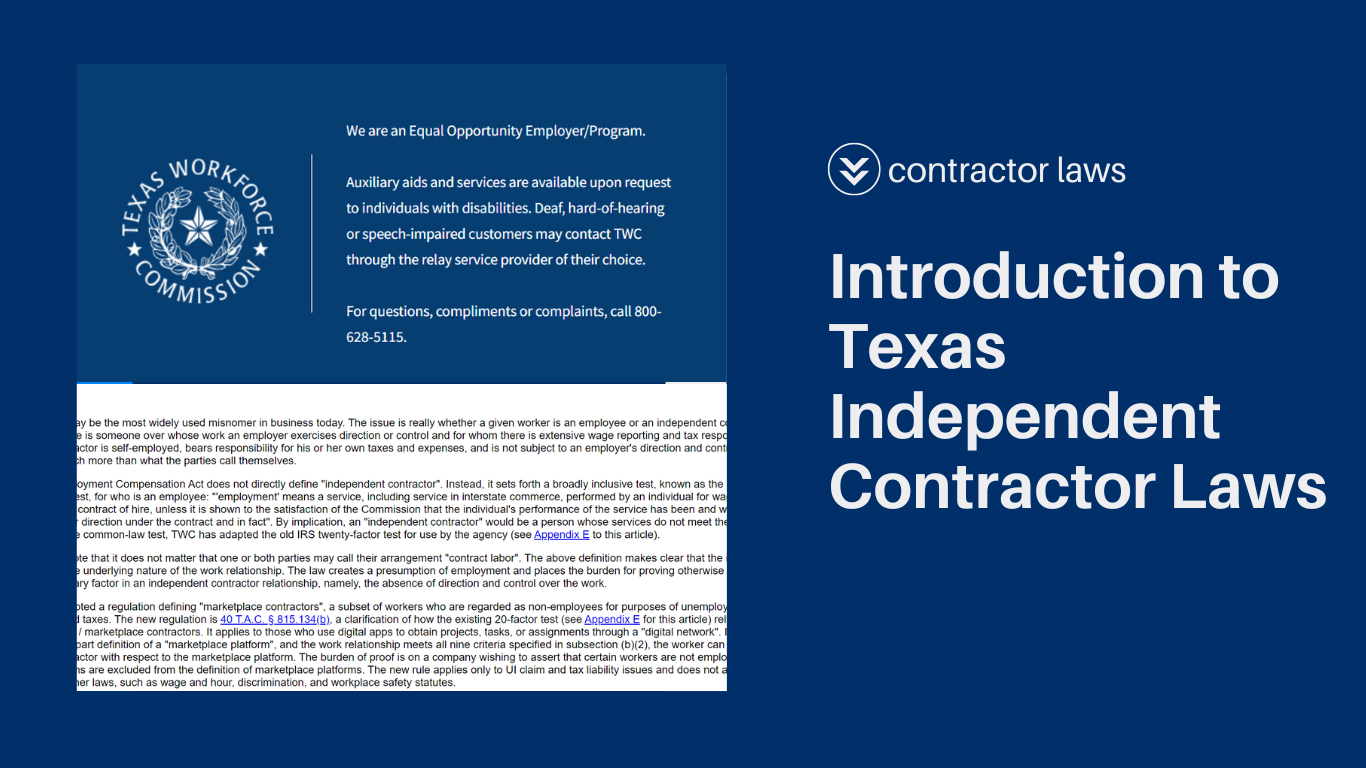Introduction to Texas Independent Contractor Laws

Understanding Texas independent contractor laws is crucial for businesses and individuals engaging in contractor relationships. Independent contractors provide flexibility and specialized skills without the obligations that come with full-time employees. However, misclassifying employees as contractors can lead to severe legal and financial repercussions.
Defining an Independent Contractor in Texas
Key Characteristics
An independent contractor operates independently and controls the manner and means of completing their work. They typically provide services to multiple clients, set their own hours, and use their own tools and resources. Unlike employees, contractors are not entitled to employee benefits or protections under employment law.
Differences Between Employees and Contractors
Employees work under the direct supervision of an employer, follow set schedules, and use employer-provided tools. They are eligible for benefits like health insurance, workers’ compensation, and unemployment benefits. Contractors, on the other hand, maintain a higher degree of control over their work and are responsible for their own taxes and benefits.
Legal Requirements for Independent Contractors in Texas
IRS Guidelines
The IRS uses a multi-factor test to determine worker classification. This includes behavioral control, financial control, and the nature of the relationship. Proper classification is essential to avoid penalties and ensure compliance.
Texas Workforce Commission Rules
The Texas Workforce Commission (TWC) provides guidelines similar to the IRS but with additional state-specific regulations. The TWC focuses on the degree of control and independence the worker has in their role.
Contractual Agreements and Documentation
Essential Clauses
Contracts between businesses and independent contractors should clearly define the scope of work, payment terms, duration, and termination conditions. Clauses regarding confidentiality, intellectual property, and dispute resolution are also crucial.
Importance of Written Contracts
While verbal agreements can be binding, written contracts provide a clear reference and protect both parties in case of disputes. They outline the expectations and obligations, minimizing the risk of miscommunication and legal issues.
Tax Obligations for Independent Contractors
Self-Employment Taxes
Independent contractors must pay self-employment taxes, which cover Social Security and Medicare. This tax is typically around 15.3% of net earnings. Contractors should set aside funds to cover these taxes and make quarterly estimated tax payments to the IRS.
Filing Requirements
Contractors must file an annual tax return using Schedule C (Form 1040) to report income and expenses. They may also need to file state tax returns, depending on their business activities and residency.
Workers’ Compensation and Insurance
Unlike employees, independent contractors are not automatically covered by an employer’s workers’ compensation insurance. However, they can obtain their own coverage to protect against work-related injuries. General liability and professional liability insurance are also advisable to safeguard their business operations.
Intellectual Property and Confidentiality
Protecting Business Interests
Businesses should include clauses in their contracts to protect intellectual property (IP) created during the contractor’s engagement. This ensures that any inventions, designs, or written materials remain the property of the business.
Contractor Rights
Contractors should be aware of their rights regarding IP and confidentiality. It’s crucial to negotiate terms that allow them to retain ownership of pre-existing IP and protect their own business information.
Dispute Resolution and Legal Recourse
Common Disputes
Disputes between businesses and contractors often arise over payment, scope of work, and contract terms. Clear communication and detailed contracts can prevent many of these issues.
Resolution Mechanisms
Contracts should outline dispute resolution methods such as mediation or arbitration. These alternatives to litigation can save time and money while providing a fair outcome for both parties.
Misclassification Risks and Penalties
Legal Consequences
Misclassifying an employee as an independent contractor can result in significant penalties, including back taxes, fines, and interest. Both the IRS and TWC actively audit businesses for compliance.
Financial Implications
In addition to penalties, misclassification can lead to back payments for benefits and overtime, as well as legal fees. Businesses may also face lawsuits from misclassified workers seeking compensation.
Best Practices for Hiring Independent Contractors
Vetting Process
Conduct thorough background checks and verify the contractor’s qualifications and experience. This helps ensure they are capable of delivering the required services and reduces the risk of disputes.
Contract Management
Maintain clear and organized records of all contracts and communications. Regularly review and update contracts to reflect any changes in the working relationship or legal requirements.
Employment Law vs. Contractor Law in Texas
Key Differences
Employment laws provide protections and benefits to employees that contractors do not receive. Understanding these differences helps businesses comply with regulations and avoid misclassification.
Compliance Strategies
Businesses should conduct regular audits of their contractor relationships and ensure that their classification practices align with IRS and TWC guidelines. Training for managers and HR personnel on classification rules is also beneficial.
Impact of Federal Laws on Texas Contractors
Relevant Federal Regulations
Federal laws such as the Fair Labor Standards Act (FLSA) and the National Labor Relations Act (NLRA) can impact independent contractor status. It’s essential to stay informed about these regulations and their implications.
State-Federal Law Interplay
Texas businesses must navigate both state and federal laws when engaging independent contractors. Understanding how these laws interact helps ensure comprehensive compliance and reduces legal risks.
Case Studies and Real-World Examples
Successful Compliance
Case studies of businesses that have successfully navigated independent contractor laws can provide valuable insights and best practices. These examples highlight the importance of proper classification and contractual agreements.
Misclassification Cases
Examining cases where businesses faced penalties for misclassification can serve as cautionary tales. These examples underscore the risks and consequences of non-compliance.
Future Trends in Independent Contractor Laws
Emerging Legal Trends
The rise of the gig economy and remote work is driving changes in independent contractor laws. Staying informed about these trends helps businesses adapt and remain compliant.
Impact of Gig Economy
As more workers participate in gig and freelance work, legal frameworks are evolving to address their unique needs. Businesses must stay updated on these developments to effectively manage their contractor relationships.
FAQs on Texas Independent Contractor Laws
What defines an independent contractor in Texas?
An independent contractor operates independently, controls their work, and typically serves multiple clients without receiving employee benefits.
How does the IRS determine if someone is an independent contractor?
The IRS uses a multi-factor test focusing on behavioral control, financial control, and the nature of the relationship to classify workers.
What are the penalties for misclassifying an employee as a contractor?
Penalties can include back taxes, fines, interest, and back payments for benefits and overtime. Legal fees and lawsuits from misclassified workers are also possible.
Do independent contractors need their own insurance?
Yes, independent contractors should obtain their own liability and workers’ compensation insurance to protect against work-related injuries and business risks.
What should be included in a contractor agreement?
A contractor agreement should define the scope of work, payment terms, duration, termination conditions, confidentiality, and intellectual property rights.
How do federal laws impact independent contractor status in Texas?
Federal laws like the FLSA and NLRA can influence contractor status, and businesses must comply with both state and federal regulations.
Conclusion
Understanding and complying with Texas independent contractor laws is essential for businesses to avoid legal and financial risks. Proper classification, detailed contracts, and adherence to state and federal regulations are key to maintaining successful contractor relationships. By staying informed about emerging trends and best practices, businesses can effectively manage their workforce and safeguard their operations.


Leave a Reply